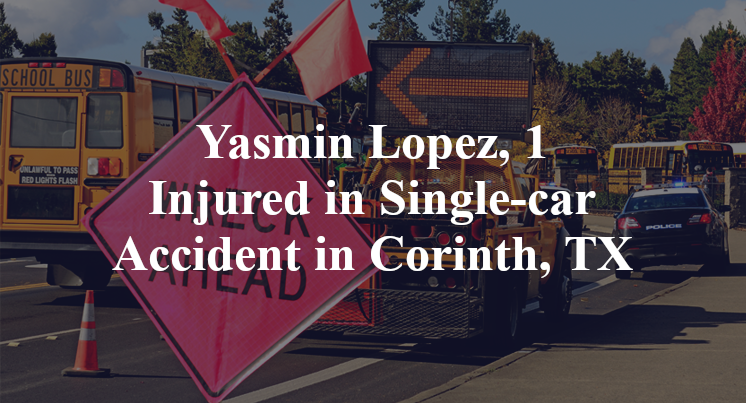Yasmin Lopez, 1 Injured in Single-car Accident in Corinth, TX
Denton County, TX — June 15, 2025, Yasmin Lopez and another person were injured in a single-car accident at approximately 2:00 a.m. along I-35E.
According to authorities, a 24-year-old man and his passenger—23-year-old Yasmin Lopez—were traveling in a northwest bound Hyundai Sonata on Interstate Highway 35E near F.M. 2181 when the accident took place.

Officials indicate that, for reasons yet to be confirmed, the Sonata failed to safely maintain its lane of travel. It was consequently involved in a single-vehicle collision in which it apparently struck a road sign. Both Lopez and the man who had been driving the Sonata reportedly sustained serious injuries over the course of the accident. Additional details pertaining to this incident are not available at this point in time. The investigation is currently ongoing.
Commentary by Attorney Michael Grossman
When a car veers off a major highway and strikes a fixed object like a road sign, especially in the early morning hours, it’s easy to assume distraction or fatigue played a role. But when both people inside the vehicle are seriously injured, assumptions aren’t enough. The crash deserves a closer look into what else may have contributed—and whether it was properly examined.
1. Did the authorities thoroughly investigate the crash?
A single-car crash on a high-speed highway should raise questions about how the vehicle left its lane. Did investigators evaluate whether the driver took any corrective action? Was there evidence of braking, overcorrection, or swerving? Did anyone look at possible roadway debris or another vehicle that could have triggered an evasive maneuver? These details don’t always make it into initial reports unless a deeper reconstruction is done—and that can make all the difference in understanding what actually happened.
2. Has anyone looked into the possibility that a vehicle defect caused the crash?
The Hyundai’s systems—including brakes, steering, and tire integrity—should have been reviewed. A failure in any of those areas could easily send a car off-course. Likewise, modern vehicles are expected to have electronic stability control or lane departure systems—did those features activate as they should have? Unless someone specifically checked for mechanical or software issues after the crash, those questions may never get answered.
3. Has all the electronic data relating to the crash been collected?
A car like the Sonata likely captured valuable pre-crash data: speed, steering angle, throttle position, and brake input. That data can tell whether the driver attempted to respond or if the vehicle failed to help avoid the impact. And considering the crash occurred near a known highway exit, nearby traffic or surveillance cameras may have picked up part of the incident. As always, this kind of data fades fast unless it’s gathered right away.
When both driver and passenger are seriously hurt in a single-vehicle crash, it's not just a matter of who was at fault—it’s a question of whether every explanation has been properly explored.
Takeaways:
- Highway crashes involving fixed-object impacts require full scene and path analysis.
- Tire, brake, or electronic system failures may explain sudden lane departures.
- Vehicle telemetry and area cameras may hold critical insights—if retrieved in time.

*We appreciate your feedback and welcome anyone to comment on our blog entries, however all visitor blog comments must be approved by the site moderator prior to showing live on the site. By submitting a blog comment you acknowledge that your post may appear live on the site for any visitors to see, pending moderator approval. The operators of this site are not responsible for the accuracy or content of the comments made by site visitors. By submitting a comment, blog post, or email to this site you acknowledge that you may receive a response with regard to your questions or concerns. If you contact Grossman Law Offices using this online form, your message will not create an attorney-client relationship and will not necessarily be treated as privileged or confidential! You should not send sensitive or confidential information via the Internet. Since the Internet is not necessarily a secure environment, it is not possible to ensure that your message sent via the Internet might be kept secure and confidential. When you fill out a contact or comment form, send us an email directly, initiate a chat session or call us, you acknowledge we may use your contact information to communicate with you in the future for marketing purposes, but such marketing will always be done in an ethical way.